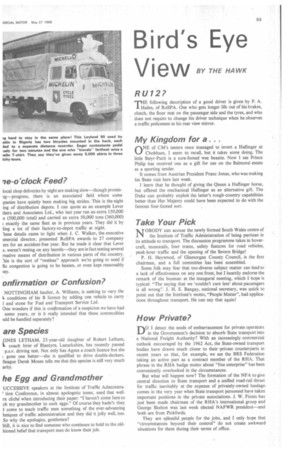Bird's Eye ‘,.
Page 95

If you've noticed an error in this article please click here to report it so we can fix it.
v lew BY THE HAWK
7e-o'clock Feed?
local shop deliveries by night are making slow—though promisig—progress, there is an associated field where some ipanies have quietly been making big strides. This is the night ing of distribution depots. I can quote as an example Lever thers and Associates Ltd., who last year ran an extra 150,000 s (500,000 total) and carried an extra 50,000 tons (360,000) exactly the same fleet as in previous years. They did it by ling a lot of their factory-to-depot traffic at night.
'hese details came to light when J. C. Walker, the executive tmercial director, presented RoSPA awards to 27 company ers for an accident-free year. But he made it clear that Lever s. weren't resting on any laurels—they are in fact testing several rnative means of distribution in various parts of the country. 'his is the sort of "restless" approach we're going to need if fic congestion is going to be beaten, or even kept reasonably
onfirmation or Confusion?
NOTTINGHAM haulier, A. Williams, is seeking to vary the conditions of his B licence by adding one vehicle to carry 1 and stone for Fuel and Transport Service Ltd.
One wonders if this is confirmation of a suspicion we have had some years, or is it really intended that these commodities ■ uld be handled separately?
are Species
pNES LETHAM, 23 year-old daughter of Robert Letham, k coach hirer of Blantyre, Lanarkshire, has recently passed p.s.v. driving test. Not only has Agnes a coach licence but she gone one better—she is qualified to drive double-deckers. Ileague Derek Moses tells me that this species is still very much arity.
he Egg and Grandmother
UCCESSIVE speakers at the Institute of Traffic Administration Conference, in almost apologetic tones, used that wellrn cliche when introducing their paper: "I haven't come here to ch my grandmother to suck eggs." Of course they hadn't: they J come to teach traffic men something of the ever-advancing hniques of traffic administration and they did it jolly well, too. So why the apologies. gentlemen?
Still, it is nice to find someone who continues to hold to the oldhioned belief that transport men do know their job.
RU 1 2 ?
THiE following description of a good driver is given by P. A. ailes, of RoSPA. One who gets longer life out of his brakes, clutch, the floor mat on the passenger side and the tyres, and who does not require to change his driver technique when he observes a traffic policemen in his rear view mirror.
My Kingdom for a . .
ONE of CM's testers once managed to invert a Haflinger at Chobham, I seem to recall, but it takes some doing. The little Steyr-Puch is a sure-footed wee beastie. Now I see Prince Philip has received one as a gift for use on the Balmoral estate as a sporting tender.
It comes from Austrian President Franz Jonas, who was making his State visit here last week.
I learn that he thought of giving the Queen a Haflinger horse, but offered the mechanical Haflinger as an alternative gift. The Duke can probably exploit the latter's rough-country capabilities better than Her Majesty could have been expected to do with the famous four-footed sort.
Take Your Pick
NOBODY can accuse the newly formed South Wales centre of the Institute of Traffic Administration of being partisan in its attitude to transport. The discussion programme takes in hovercraft, monorails, liner trains, safety features for road vehicles. peak-hour traffic and the opening of the Severn Bridge!
P. H. Heywood, of Glamorgan County Council, is the first chairman, and a full committee has been assembled.
Some folk may fear that too-diverse subject matter can lead to a lack of effectiveness on any one front, but I heartily endorse the remark of the busman at the inaugural meeting, which I hope is typical: "The saying that we 'couldn't care less' about passengers is all wrong". J. H. S. Bangay, national secretary, was quick to point out that the Institute's motto, "People Matter", had applications throughout transport. He can say that again!
How Private?
Do I detect the seeds of embarrassment for private operators in the Government's decision to absorb State transport into a National Freight Authority? With an increasingly commercial outlook encouraged by the 1962 Act, the State-owned transport bodies have drawn much closer to their private counterparts in recent years so that, for example, we see the BRS Federation taking an active part as a contract member of the RHA. That phrase in the RHA badge motto about "free enterprise" has been conveniently overlooked in the circumstances.
But what will happen now? The formation of the NFA to give central direction to State transport and a unified road-rail thrust for traffic inevitably at the expense of privately owned haulage comes in the very year when State transport personnel have taken important positions in the private associations. J. W. Finnis has just been made chairman of the RI-IA's international group and George Skelton was last week elected NAFWR president—and both are from Pickfords.
They are splendid people for the jobs, and I only hope that "circumstances beyond their control" do not create awkward situations for them during their terms of office.




































































































































































































































































